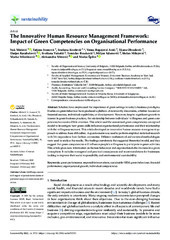Please use this identifier to cite or link to this item:
https://rfos.fon.bg.ac.rs/handle/123456789/2375Full metadata record
| DC Field | Value | Language |
|---|---|---|
| dc.creator | Mircetić, Vuk | |
| dc.creator | Ivanović, Tatjana | |
| dc.creator | Knežević, Snežana | |
| dc.creator | Bogojević-Arsić, Vesna | |
| dc.creator | Obradović, Tijana | |
| dc.creator | Karabasević, Darjan | |
| dc.creator | Vukotić, Svetlana | |
| dc.creator | Brzaković, Tomislav | |
| dc.creator | Adamović, Miljan | |
| dc.creator | Milojević, Stefan | |
| dc.creator | Milašinović, Marko | |
| dc.creator | Mitrović, Aleksandra | |
| dc.creator | Špiler, Marko | |
| dc.date.accessioned | 2023-05-12T11:44:13Z | - |
| dc.date.available | 2023-05-12T11:44:13Z | - |
| dc.date.issued | 2022 | |
| dc.identifier.issn | 2071-1050 | |
| dc.identifier.uri | https://rfos.fon.bg.ac.rs/handle/123456789/2375 | - |
| dc.description.abstract | Scholars have emphasised the importance of green settings in today's business paradigms. Studies on green behaviour have produced a plethora of noteworthy discoveries, whether focused on financial success, individual capabilities, or development. However, despite significant growth in interest in green business practices, the relationship between individuals' willingness and green competencies has received little attention. This article used the customised green competencies conceptual model to investigate how green skills influence organisational performance and their relationship with the willingness moment. This article developed an innovative human resource management approach to address these difficulties. A questionnaire was used to perform empirical statistical research with 516 respondents from Serbian universities. Different mathematical and statistical methodologies were used to analyse the results. The findings corroborate the suggested theoretical model, and they suggest that green competencies will influence people's willingness to participate in green activities. This article gives new information on human behaviour and organisational effectiveness in a green atmosphere. It includes managerial and practical consequences and recommendations for businesses looking to improve their social responsibility and environmental sustainability. | en |
| dc.publisher | MDPI, Basel | |
| dc.rights | openAccess | |
| dc.rights.uri | https://creativecommons.org/licenses/by/4.0/ | |
| dc.source | Sustainability | |
| dc.subject | sustainable HRM | en |
| dc.subject | responsible innovations | en |
| dc.subject | organisational growth | en |
| dc.subject | individual competencies | en |
| dc.subject | green performance | en |
| dc.subject | green behaviour | en |
| dc.subject | financial performance | en |
| dc.title | The Innovative Human Resource Management Framework: Impact of Green Competencies on Organisational Performance | en |
| dc.type | article | |
| dc.rights.license | BY | |
| dc.citation.issue | 5 | |
| dc.citation.other | 14(5): - | |
| dc.citation.rank | M22~ | |
| dc.citation.volume | 14 | |
| dc.identifier.doi | 10.3390/su14052713 | |
| dc.identifier.fulltext | http://prototype2.rcub.bg.ac.rs/bitstream/id/881/2371.pdf | |
| dc.identifier.rcub | conv_2632 | |
| dc.identifier.scopus | 2-s2.0-85125787979 | |
| dc.identifier.wos | 000768498600001 | |
| dc.type.version | publishedVersion | |
| item.cerifentitytype | Publications | - |
| item.fulltext | With Fulltext | - |
| item.grantfulltext | open | - |
| item.openairecristype | http://purl.org/coar/resource_type/c_18cf | - |
| item.openairetype | article | - |
| Appears in Collections: | Radovi istraživača / Researchers’ publications | |
SCOPUSTM
Citations
27
checked on Nov 17, 2025
Page view(s)
22
checked on Dec 28, 2025
Download(s)
6
checked on Dec 28, 2025
Google ScholarTM
Check
Altmetric
This item is licensed under a Creative Commons License


